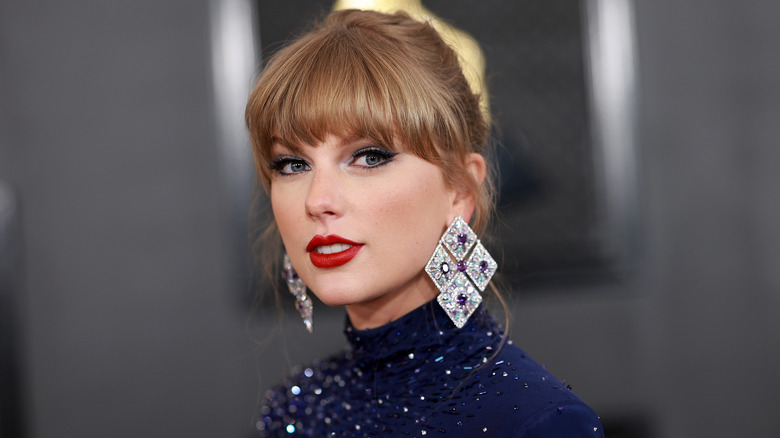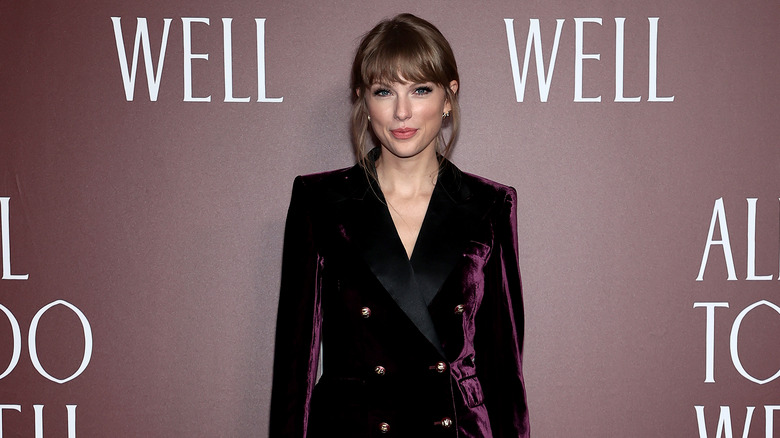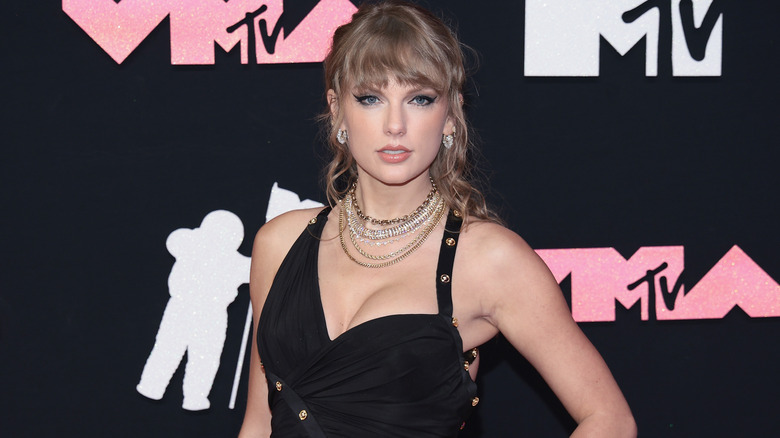The Sad Reason Taylor Swift Developed An Eating Disorder
During her "Miss Americana" documentary, Taylor Swift announced that she'd once struggled with an eating disorder. Released in 2020, the project delved into Swift's relationship and feelings about body image and low self-esteem. She explained her decision to address the personal hurdle in a Variety interview that year. "I didn't know if I was going to feel comfortable with talking about body image and talking about the stuff I've gone through in terms of how unhealthy that's been for me — my relationship with food and all that over the years," the star shared, later revealing how her eating disorder was triggered by viewing images of herself in the media. "I remember how, when I was 18, that was the first time I was on the cover of a magazine. And the headline was like 'Pregnant at 18?'" Swift reminisced. "And it was because I had worn something that made my lower stomach look not flat."
From there, she developed an unhealthy fixation with her body, worsened by continuous media commentary, until she felt that not eating was a source of strength. "I thought that I was supposed to feel like I was going to pass out at the end of a show, or in the middle of it," she added. "Now I realize, no, if you eat food, have energy, get stronger, you can do all these shows and not feel (enervated)." Following her admission, Swift received a wave of support from her fans and peers.
If you need help with an eating disorder, or know someone who does, help is available. Visit the National Eating Disorders Association website or contact NEDA's Live Helpline at 1-800-931-2237. You can also receive 24/7 Crisis Support via text (send NEDA to 741-741).
Taylor Swift experienced body shaming from other celebs
"Miss Americana" marked one of the first times that Taylor Swift spoke about her experience with media-induced body shaming. However, Swift's body shaming didn't come only from media outlets and mean-spirited fans. Swift also experienced it with some of her fellow stars. Singer Demi Lovato, who seemingly once hated Swift (and vice versa) decried Swift's controversial girl squad, which was mostly composed of other tall, slender beauties. "To be honest, and this will probably get me in trouble, I don't see anybody in any sort of squad that has a normal body," Lovato shared with Glamour in 2016. "It's kind of this false image of what people should look like. And what they should be like, and it's not real."
Ultimately, Lovato was taken to task for branding people who looked like Swift and her friends as not being "normal" or realistic. According to E! News, a source close to Swift explained the bond between her and her squad, which once included Gigi Hadid and Zendaya. "Taylor has a tight group of women in her life that all have her and each others' back and sometimes people just want that," said the source. "She thought it was unnecessary for her to make those comments."
Comic Nikki Glaser also once made unflattering comments about Swift's weight, which the singer included in her documentary. During her Instagram apology, Glaser revealed that she actually loved Swift, and may have been projecting her own insecurities about body image onto her. "This quote should be used as an example of "projection" in PSYCH101 textbooks," wrote Glaser.
She received pushback about a music video
In 2022, Taylor Swift gave fans a deeper glimpse into her body image issues when she released her music video for "Anti-Hero," derived from her "Midnights" album. During the original version, which is no longer available, Swift stood in loungewear on a scale that read "fat" to signify how she sometimes felt about her body. Unfortunately, Swift's attempt to share her vulnerabilities wasn't received well, as fans then accused the singer of dissing larger bodies and promoting fatphobia.
"Fat people are awesome. Taylor Swift's choice of imagery in her 'Anti-Hero' video ... is not," tweeted one observer. "Fatphobia is that image. That's what fatphobia is. It's also a million other things that you don't think create a world unsafe for fat people." Fans also complained about Swift seemingly ignoring the online criticism. "Imagine if Taylor Swift actually apologized for that section of the video and took accountability instead of her and her team pretending she doesn't see the thousands and thousands of tweets pointing out the fatphobia in it," wrote another X user. Despite the building pushback, Swift did see the reactions and also acknowledged them — just not with a formal statement. Instead, Swift and her team deleted the scene from the visual a few days later, according to The Guardian.



